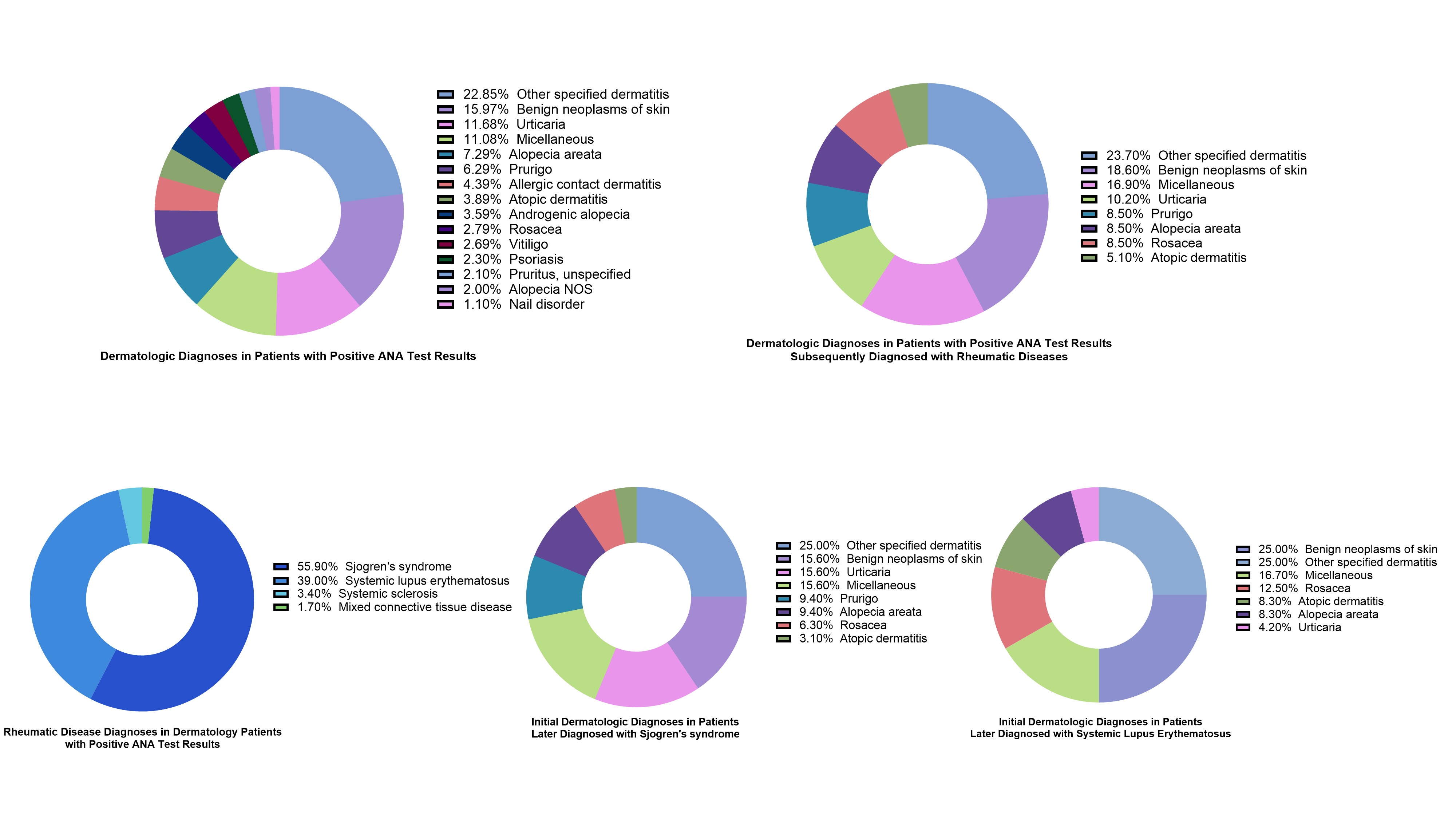Session Information
Session Type: Poster Session B
Session Time: 10:30AM-12:30PM
Background/Purpose: Cutaneous manifestations are common in rheumatic diseases and can be early indicators. This study investigates the prevalence of rheumatic diseases diagnosed through ANA (Antinuclear antibody) testing in dermatology patients and characterizes the associated dermatological diagnoses and ANA antibody patterns at a single center tertiary hospital.
Methods: From January 1, 2013, to December 31, 2023, we collected antinuclear antibody (ANA) titers and patterns from dermatology outpatient visits at a national single center tertiary hospital. Patients with positive ANA results were further evaluated for dermatological and rheumatic disease diagnoses. Patients previously seen by rheumatology or with a known rheumatic disease were excluded.
Results: Of the 8,347 patients who initially visited dermatology and underwent ANA testing, 1,054 (12.7%) tested positive and were referred to rheumatology. The ANA titers among positive patients were as follows: 1:80 in 332 patients (31.5%), 1:160 in 167 patients (15.8%), and 1:1280 or higher in 33 patients (3.1%). The ANA patterns included homogenous in 198 patients (18.8%), speckled in 7.7%, cytoplasmic in 4.5%, and nucleolar in 3.3%. Among these, 59 patients (5.6%) were diagnosed with rheumatic diseases: Sjögren’s syndrome in 32 patients (55.9%), systemic lupus erythematosus (SLE) in 24 patients (39.0%), systemic sclerosis in 2 patients (3.4%), and mixed connective tissue disease in 1 patient (1.7%).
Dermatological diagnoses for Sjögren’s syndrome patients included dermatitis (21.8%), urticaria (15.6%), benign skin tumors (15.6%), pruritus (12.5%), and alopecia (12.5%). Their ANA titers were 1:1280 in 25% and 1:160 or higher in 75.1%. For SLE patients, diagnoses included dermatitis (29.1%), benign skin tumors (25.0%), alopecia (16.7%), and rosacea (12.5%). ANA titers were 1:1280 in 25.0% and 1:160 or higher in 84.4%.
Conclusion: This study elucidates a significant prevalence of rheumatic diseases diagnosed through ANA testing in dermatology patients, highlighting the critical role of ANA testing within dermatological practice. Sjögren’s syndrome and SLE emerged as the most prevalent diagnoses, each exhibiting distinct dermatological manifestations and ANA titer distributions. These findings indicate that dermatologists should remain vigilant for underlying rheumatic diseases in patients presenting with specific cutaneous symptoms and positive ANA results.
To cite this abstract in AMA style:
Choi Y, Lee M, Yoo W. Antinuclear Antibody Positivity and Its Diagnostic Implications for Rheumatic Diseases in Dermatology Patients: A Comprehensive Single Center Analysis [abstract]. Arthritis Rheumatol. 2024; 76 (suppl 9). https://acrabstracts.org/abstract/antinuclear-antibody-positivity-and-its-diagnostic-implications-for-rheumatic-diseases-in-dermatology-patients-a-comprehensive-single-center-analysis/. Accessed .« Back to ACR Convergence 2024
ACR Meeting Abstracts - https://acrabstracts.org/abstract/antinuclear-antibody-positivity-and-its-diagnostic-implications-for-rheumatic-diseases-in-dermatology-patients-a-comprehensive-single-center-analysis/

